
Berkshire vs S&P 500 – BRK is Better (Quality over Quantity)
- BRK stock went down during last week because many focus on the negative conotations from Buffett’s shareholder meeting; airlines, no buybacks and the $50 billion accounting loss.
- However, there is investing with compounding on one side, the Berkshire side, and just betting on valuations going higher and higher, on the S&P 500 side.
- I discuss how BRK is the ultimate investment vehicle despite the 10 year under performance against the S&P. Investing is about more than beating an index over a short period.
- Given Berkshires fundamentals, margin of safety, it is likely BRK will continue to outperform the S&P 500 for a long time.
Berkshire vs S&P 500
I’ve read many comments about Buffett being old, making a terrible mistake with airlines and the headlines were all about Berkshire’s (BRK.A) (BRK.B) $50 billion quarterly loss.
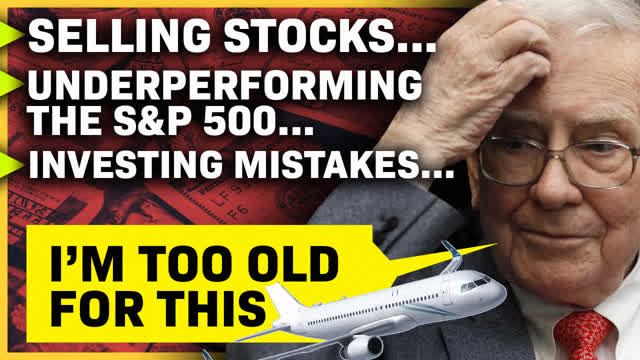
Consequently BRK significantly under performed the S&P 500 (SPY) over the last few weeks.
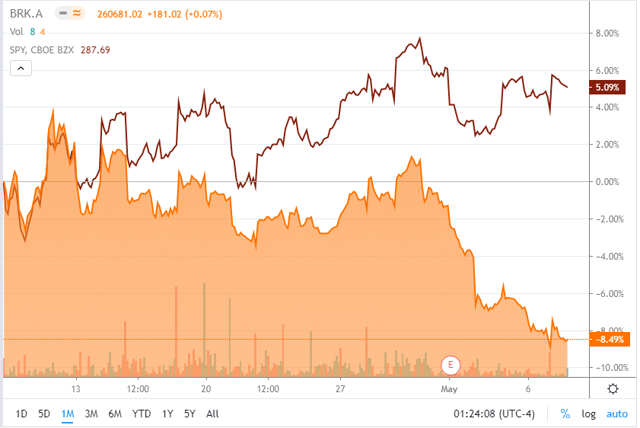
BRK vs S&P 500 over the last month
Despite the above, I am going to argue how BRK is a better investment vehicle than index funds and how it will continue to outperform over the long term, as it did in the past.
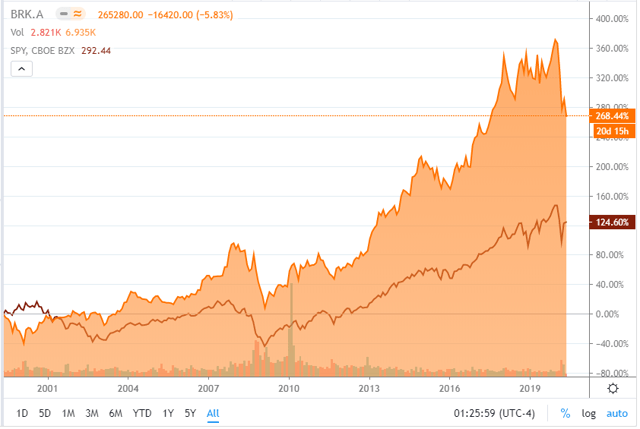
BRK’s return is more than double the SPY over the last 20 years
There are three key components within my argument:
– BRK is made for compounding equity, the core of investing.
– Mistakes are normal and the $4 billion lost with airlines is just a drop in an ocean. A risk worth taking given the upside successful investments create.
– BRK is a financial fortress which limits risk, another investing core. If Buffett would spend the available cash on buybacks, like many other companies do, BRK’s stock price would skyrocket and make all performance comparisons futile.
Berkshire stock is made for compounding
When it comes to investing, it is all about compounding. You compound by allowing the businesses you own to reinvest the earnings at a high return or by reinvesting the cash you receive in the form of dividends in order to create new streams of cash flows.
The compounding effect is reflected in the equity increases over time. BRK’s shareholder equity went from $91 billion in 2005 to the current level of $375 billion for an average yearly compounding rate of 10%.
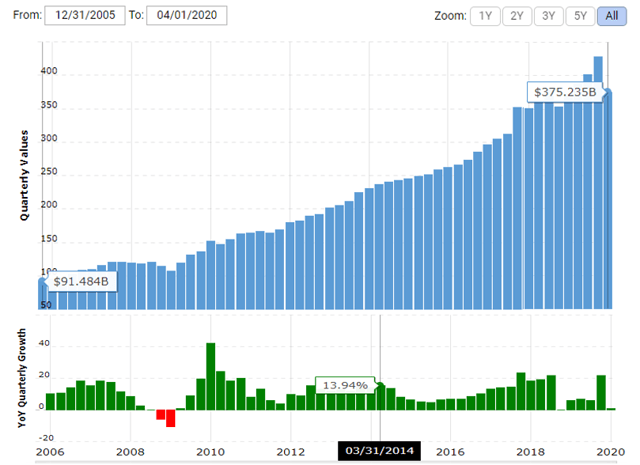
Source: BRK’s equity – Macrotrends
The S&P 500 index has seen its book value grow from 453 to 914 (points equivalent) over the same period for a growth rate of 4.7%. If we add the average dividend of 2%, the index has compounded shareholders’ wealth at a yearly rate of 6.7% over the last 15 years.
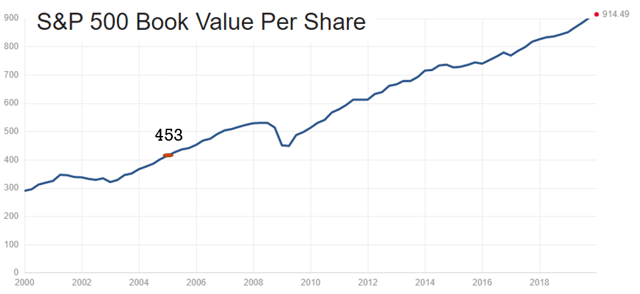
S&P 500 book value growth over the last 15 years – Source: Multpl
Compounding is what investing is all about as in the long-term stock prices will reflect the underlying performance of the business. For me, a business that quadruples shareholders’ equity is better than one that ‘just’ doubles it. Given the current fundamentals, it is likely the same will happen in the next decade.
BRK’s real business earnings in 2019 were $31.6 billion. Thus, on a market capitalization of $421 billion, the company created a return of 7.5% for shareholders.
in 2019, the S&P 500 index had earnings of 140 points giving a return of around 5% at current levels.
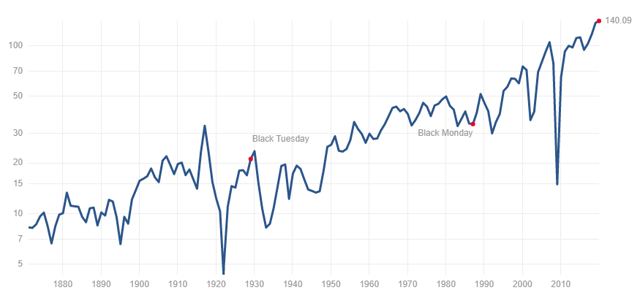
S&P 500 earnings – Source: Multpl
So, even in 2019, which was a great year for both BRK and the S&P 500, BRK created more value for shareholders from an equity/valuation perspective. Therefore, I believe BRK will continue to compound at a faster rate than the S&P 500 index.
However, investing is not only about reward, it is actually firstly about risk.
Berkshire is a low risk investment
BRK achieved the above performance while always being a financial fortress with huge amounts of cash.
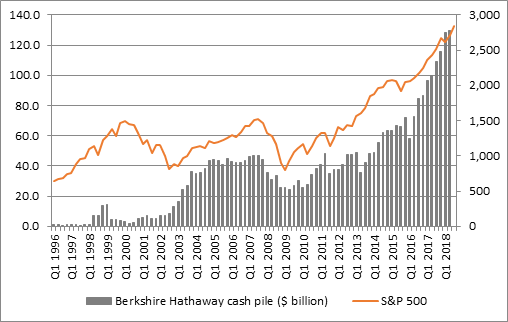
BRK’s cash pile has been higher than $120 billion for years now – Source: MTI
On the contrary, most S&P 500 companies spent as much as they could on buybacks.
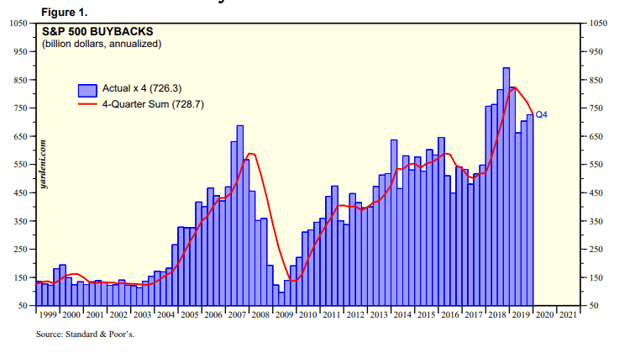
S&P 500 buybacks – Source: Yardeni
If BRK would spend $100 billion on buybacks, I don’t think there would ever be a debate about how Buffett under performed the S&P 500 because BRK would skyrocket. However, Buffett will not do that because he is not about short term performance, he is about long-term investing. Therefore, even if BRK didn’t outperform the index from a stock price perspective over the last years, from an investing risk and reward perspective, BRK’s returns are far better.
Buffett’s airlines mistake is normal and actually irrelevant
Buffett invested in airlines during their 2017 stock rout. He put approximately $2 billion into each of the 4 largest US airlines. He probably got out something around $5 billion when we include the dividends received since.
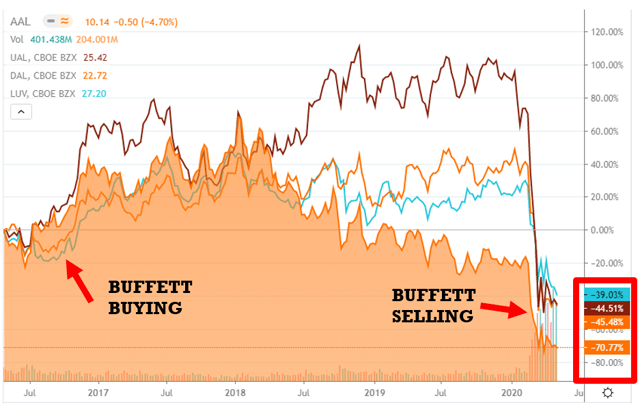
BIG 4 US airlines performance since Buffett bought
On average the positions are down 50%, if I add a bit of dividends, the loss for Buffett should be between $3 and $4 billion. On total shareholders equity of $375 billion that is approximately just 1%.
This is also what investing is, in his 2007 letter to shareholders, Buffett clearly described the risks of investing in airlines.
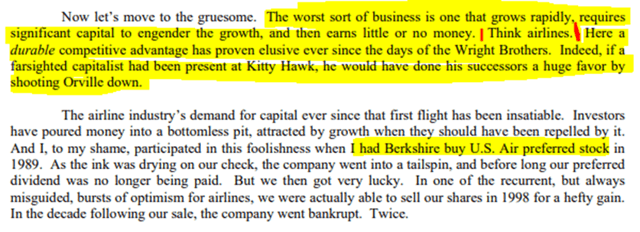
Buffett’s explanation of the risk of investing in airlines – Source: BRK letter to shareholders 2007
Further, he was so prescient to also say how he will likely make many more investing mistakes. Talking about forbidden fruits.

Buffett’s promise of making more mistakes – Source: BRK letter to shareholders 2007
Why am I saying the above investment mistake is irrelevant? Well, because investing is about making mistakes. We, as investors, always try to find those businesses that will compound our capital into eternity. To find them, it is acceptable to make a few mistakes here and there.
The following table I made explains how even if you make 6 mistakes out of 10 investments, you will likely end up on a positive note, because just 3 really good investments out of the 10, will likely make up for the 6 mistakes.

Distribution of investment outcomes and total return – Source: Sven’s Free Investing Course
Buffett is playing the same game. He knows that some investments will be mistakes, but also that others will make up for the mistakes. After all, by investing, you can only lose what you put in while the upside is unlimited.
Berkshire remains the ultimate investment vehicle
If you are a value investor like me, then you focus on earnings, valuations, a margin of safety, the quality of the business and you try to keep a holistic perspective on each investment. A long-term holistic perspective on BRK tells us that it will continue to compound for a long-term and how it provides something few others do, a margin of safety in the form of $120 billion in cash.
As investing is personal, see how BRK as financial fortress, that will likely deliver a high single digit return over the long-term with low risk, fits your portfolio and your financial goals.
If you prefer watching or listening, please enjoy my video discussing the above and more.
Video summary:
1:56 – Investing risk and reward – getting rich slowly! Performance comparison with S&P 500 index.
10:36 – Buffett’s airlines mistake is not really a mistake, just plain investing.
15:05 – Don’t bet against America!
If you enjoyed this article, please consider subscribing. Also, check my free stock market investing course to learn more about investing.